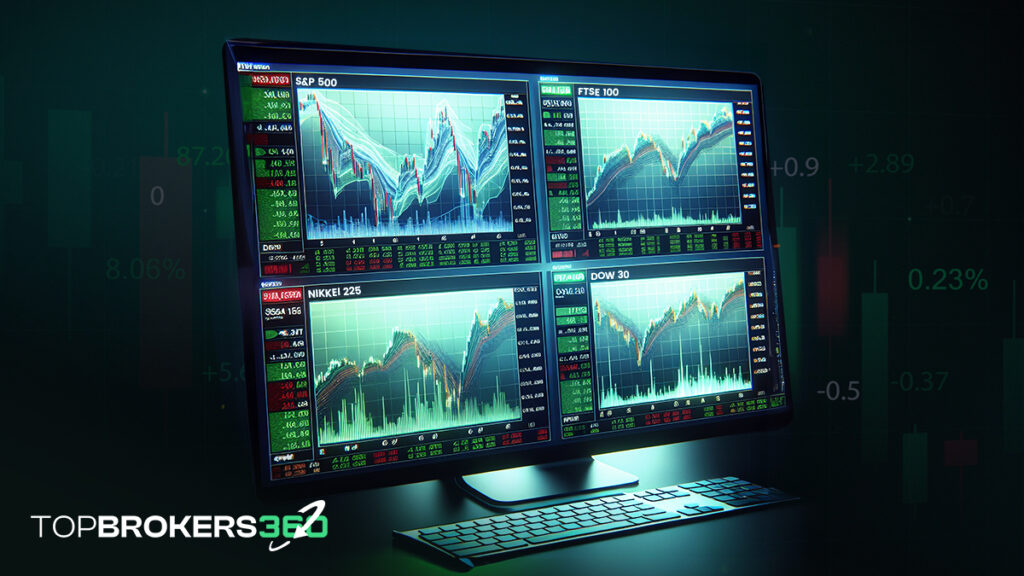
Market Update
Deceleration in Stock Market Rally
The stock market rally, which has been going strong recently, seems to be slowing down in May 2024. Investors have been enjoying a period of rising stock prices, but now things are cooling off a bit. This slowdown is something traders need to keep an eye on as it can affect their investment decisions. For further insights on the market trends and the influence of interest rates, refer to the detailed analysis by BlackRock.
Influence of Federal Reserve's Stance on Interest Rates
One big factor affecting the market right now is the Federal Reserve’s stance on interest rates. As always, the Fed’s decisions about interest rates can have a big impact on how investors behave. People are watching closely to see what the Fed will do next, as any changes could shake up the market.
Impact of Monetary Policy on Economic Growth
Monetary policy, which includes things like interest rates and how much money is in the economy, is also playing a role in shaping market trends. Changes in monetary policy can affect economic growth, which in turn affects the stock market. Traders are paying attention to how these policies might impact their investments.
Signs of Stocks Retreating to Fair Value
Metals Market Trends
Factors Influencing Metals Market in May 2024
- Supply and Demand Dynamics: The balance between supply and demand for metals, including copper, aluminum, and precious metals, can influence prices. Factors such as production levels, consumption patterns, and inventory data affect market dynamics.Detailed analysis on these factors can be found at S&P Global Commodity Insights.
- Economic Conditions: The global economic recovery drives demand for metals across industries such as construction, manufacturing, and renewable energy. Economic indicators such as GDP growth, industrial production, and consumer spending impact metal prices.
- Technological Advancements: Innovations in technology, particularly in sectors like electric vehicles and renewable energy, create new demand for metals such as lithium, cobalt, and rare earth metals.
- Investor Sentiment: Market sentiment, influenced by factors like geopolitical events and monetary policy decisions, can impact investor demand for metals as safe-haven assets or speculative investments.
Impact of Global Economic Recovery on Demand for Metals
- The ongoing global economic recovery fuels demand for metals in infrastructure projects, construction, manufacturing, and renewable energy initiatives.
- Increased government spending on infrastructure development and stimulus measures support metal prices by boosting demand.
- As economies rebound from the pandemic-induced slowdown, demand for metals is expected to remain strong, supporting prices in May.
Role of Geopolitical Events in Shaping Metals Market
- Trade Tensions: Escalating trade tensions between major economies, such as the United States and China, can lead to tariffs and trade restrictions on metal imports and exports, affecting prices and market sentiment.
- Geopolitical Conflict: Political instability and conflicts in metal-producing regions, such as the Middle East and Africa, can disrupt supply chains and lead to supply disruptions, driving prices higher.
- Sanctions: Imposition of sanctions on metal-producing countries or companies can restrict exports and impact metal prices by reducing supply or increasing geopolitical risk premiums.
Price Forecasts for Specific Metals
- Copper: Strong demand from infrastructure projects, electric vehicles, and renewable energy initiatives is expected to support copper prices. Supply constraints and increasing use cases for copper in various industries contribute to a bullish outlook.
- Aluminum: Growing demand in automotive and aerospace sectors, along with sustainability initiatives, drives aluminum prices higher. Technological advancements and recycling efforts further support aluminum market trends.
- Precious Metals (Gold and Silver): Gold and silver prices are influenced by factors such as inflation expectations, currency movements, and investor sentiment. As safe-haven assets, gold and silver may see upward movement in response to economic uncertainty and geopolitical risks. Traders should monitor central bank policies, inflation data, and currency fluctuations to assess the outlook for precious metals.
Forex Analysis May 2024

Global Economic Conditions and Currency Fluctuations
- Global economic conditions, including GDP growth, inflation rates, and interest rates, play a significant role in currency fluctuations.
- Strong economic data, such as robust GDP growth and low unemployment rates, typically strengthens a country's currency, while weak data can lead to depreciation.
- In May, key economic indicators to monitor include GDP growth forecasts, inflation expectations, and central bank monetary policy decisions.
Influence of Geopolitical Events on the Forex Market
- Trade Tensions: Escalating trade tensions between major economies, such as the United States and China, can lead to tariffs and trade restrictions, affecting currency values and investor sentiment.
- Geopolitical Conflicts: Political instability and conflicts in regions such as the Middle East and Eastern Europe can create uncertainty and volatility in currency markets, impacting exchange rates.
- Post-Brexit Adjustments: While the formal Brexit process concluded in January 2020, the ongoing adjustments and negotiations between the United Kingdom and the European Union continue to affect economic and trade relations. These developments still have a significant impact on the value of the British pound and Euro, as well as investor confidence in the broader European markets.
Key Indicators to Monitor in Forex Trading
- Interest Rates: Central bank decisions on interest rates, particularly from the Federal Reserve, European Central Bank, and Bank of Japan, can influence currency values. Traders should pay attention to monetary policy statements and interest rate decisions.
- Economic Calendar: Traders should keep track of economic calendars to stay informed about scheduled releases of economic indicators such as GDP growth, employment data, consumer spending, and manufacturing activity. These reports provide valuable insights into the strength of an economy and can impact currency values.
- Trade Balance: The trade balance reflects a country's exports and imports, influencing its currency strength. A positive trade balance (surplus) generally leads to currency appreciation, while a negative balance (deficit) can cause currency depreciation. Traders should monitor trade data to gauge a country's economic health and anticipate currency movements.
- Political Events: Geopolitical events such as elections, policy changes, and global conflicts can impact currency markets. Traders should stay informed about political developments that could affect currency values and adjust their trading strategies accordingly.
Commodities Forecast
The Commodities Forecast for May, reflects cautious optimism amid global uncertainties, offering traders opportunities in energy and agricultural commodities.
Cautious Optimism in Commodities Market
- May 2024 brings forth a sense of cautious optimism within the commodities market, driven by a range of factors influencing global supply and demand dynamics.
- Despite ongoing uncertainties related to economic recovery and geopolitical tensions, commodities continue to serve as a hedge against inflation and market volatility.
- Traders and investors are closely monitoring market conditions across various commodity sectors to identify potential opportunities while navigating risks effectively.
Outlook for Energy and Agricultural Commodities
- Energy Commodities: The outlook for oil and gas prices in May is subject to factors such as OPEC production decisions, global demand patterns, and geopolitical developments. Traders should monitor supply and demand fundamentals, production trends, and geopolitical risks to anticipate price movements.
- Agricultural Commodities: Weather patterns, crop yields, and global demand for food products play significant roles in shaping agricultural commodity prices. Traders should analyze supply and demand dynamics, along with weather forecasts, to identify trading opportunities and manage risks effectively.
Indices Performance Update

Role of Commodities in Shaping Index Performance
- Commodities play a crucial role in shaping the performance of indices, as they represent key components of the global economy and various industries.
- Changes in commodity prices can have a ripple effect on other sectors, influencing investor sentiment and market dynamics.
- Traders and investors closely monitor commodity trends to assess their impact on index performance and identify trading opportunities.
Analysis of the Bloomberg Commodity Index (BCOM)
- The Bloomberg Commodity Index (BCOM) is a diversified benchmark, providing investors with exposure to a wide range of commodities, including energy, metals, and agricultural products.
- The BCOM is expected to reflect market sentiment by capturing the performance of commodities across various sectors.
- Traders analyze BCOM trends to understand commodity market dynamics and assess their implications for index performance and investment strategies.
Expected Trends in the Commodities Market and Their Impact on Indices
- Trends in the commodities market, including energy, metals, and agricultural commodities, are anticipated to influence index performance in May 2024.
- Factors such as inflation, supply chain disruptions, and geopolitical tensions may drive commodity prices, impacting their contribution to index movements.
- Traders should monitor commodity prices, supply and demand dynamics, and global economic conditions to stay informed about potential opportunities and risks in the market.
Stocks Market Report
The latest insights in the Stocks Market Report for May explore the intricate interplay of company performance, economic indicators, and global events that shape investor sentiment and market trends, offering valuable cues for strategic decision-making.
Factors Influencing Stock Market Performance
- Various factors contribute to the performance of the stock market in May 2024, influencing investor sentiment and trading activity.
- Key factors include company performance, economic indicators, and global events, which collectively shape market trends and investor behavior.
Importance of Company Performance and Economic Indicators
- Company Performance:
- Earnings Season: As companies release quarterly earnings reports in May, investors will closely scrutinize financial results and guidance for insights into corporate health and future prospects.
- Tech Sector Innovations: Continued advancements in artificial intelligence, cloud computing, and cybersecurity among tech companies are expected to drive investor interest and influence sector performance.
- Economic Indicators:
- Inflation Data: The release of inflation figures by central banks and government agencies will be closely scrutinized by investors in May 2024. Rising inflation may signal potential adjustments in monetary policy, impacting market sentiment and investment strategies.
- Employment Reports: Non-farm payroll data and unemployment figures are crucial indicators of labor market conditions. Investors will closely analyze these reports for insights into consumer spending trends and overall economic health.
- Impact of Global Events on Stock Markets:
- Trade Negotiations: Ongoing trade negotiations between major economies, such as the US-China trade relations, have the potential to influence market sentiment. Positive outcomes may boost investor confidence, while setbacks could lead to increased volatility.
- Geopolitical Tensions: Escalating geopolitical tensions in regions like the Middle East or Eastern Europe may contribute to market uncertainty. Investors will monitor developments closely for potential impacts on global stability and market dynamics.
- Federal Reserve Policy Decisions: The Federal Reserve's decisions regarding interest rates and monetary policy adjustments are critical for the stock market. Any unexpected shifts in policy could trigger market reactions as investors assess the implications for borrowing costs, corporate earnings, and overall market sentiment.

